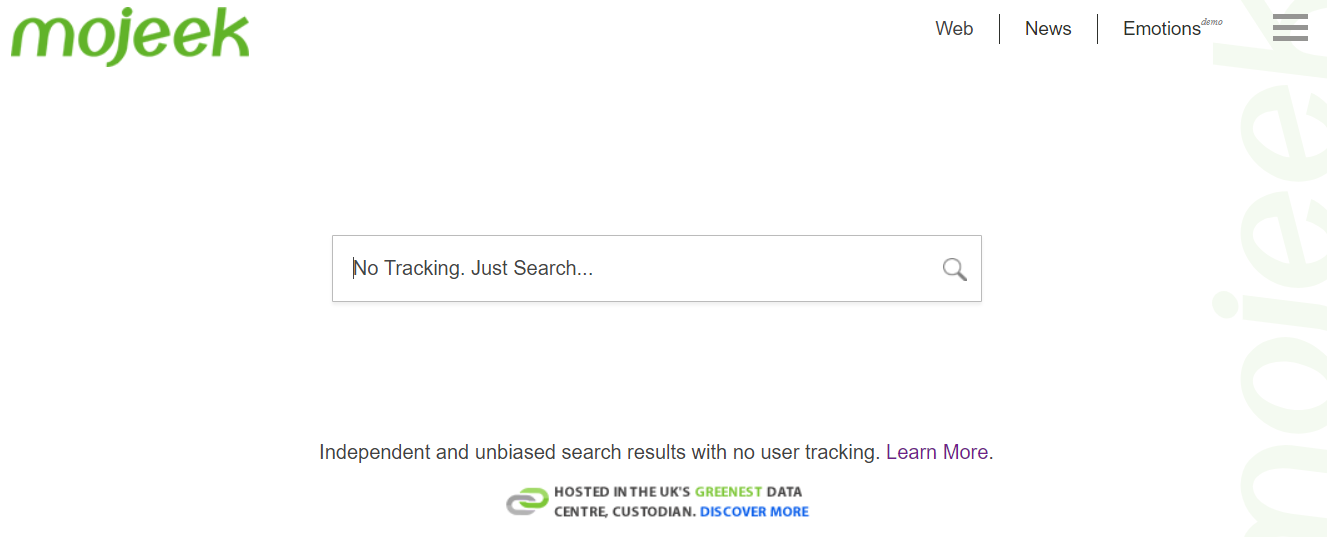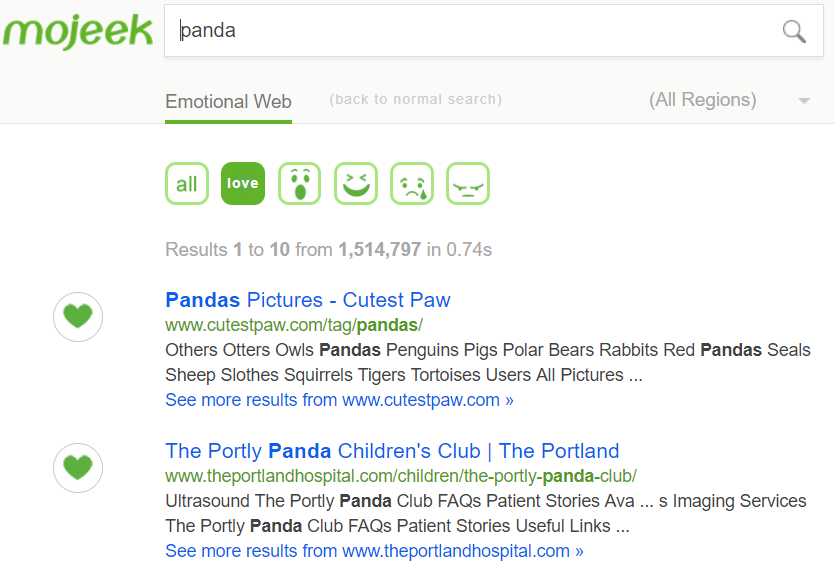It has become something of a personal mission of mine to take some time to explore global alternatives to Google here at Search Engine Watch. This all began with my piece No need for Google and has continued with more in-depth studies into Ecosia, DuckDuckGo, Baidu and Yandex.
Today, I want to turn my attention to Mojeek.
This UK-based search engine which is aiming itself at web users who want a non-creepy search engine in the vein of DuckDuckGo and Startpage, as well as a greener option akin to Ecosia.
A couple weeks ago, Marc and Finn from Mojeek hosted a Reddit AMA about their project. The response was massive.
The debate about technical choices and hurdles, the ethics of search, as well as the value of fledgling engines in the era of Google’s dominance raged on for another 48 hours after the initial livechat.
Here are some of my takeaways from that and from my own deep dive into the world of Mojeek.
How is Mojeek different?
The elevator pitch for Mojeek is ‘Independent and unbiased search results with no user tracking.’

The engine has been building its own index from scratch since 2006 which currently stands at around 2.3 billion pages with the aim of passing 4 billion by the end of 2019.
This unique index is the key differentiator between Mojeek and its competitors.
While DuckDuckGo depends in part on ad results from the Bing-Yahoo network and Startpage delivers untracked results from Google, Mojeek is seeking to ensure true independence from the corporate names by doing everything itself. In doing so they are seeking to eliminate bias in the SERPs and to be wholly trustworthy in regards to user privacy.
On top of that, Mojeek is also proud of its environmental credentials. As the service states on its homepage, its servers are hosted at ‘the UK’s greenest data center, Custodian.’
Crawler-based versus metasearch
From the outset, we can see that Mojeek is promising a lot. To really be viewed as an alternative, its founders have set themselves the monumental task of crawling the web themselves, something Google has been doing since 1997.
Its 2.3 billion page index can’t really compete with the feted ‘hundreds of billions of webpages’ Google crawls. But there’s something quite admirable about the dedication to crawler-based search while other competitors opt for the metasearch route, i.e. paying to use information from other, often more-established, crawlers to bolster results in the SERPs.
Mojeek might have its work cut out in ever matching the size of an index that Google and the metasearch engines have access to. But for users, who do want a truly different lens through which to view the web, its own crawler-based service is the only real option to them.
Unbiased results. Is this possible?
The notion of unbiased results in search is an interesting one and was a big talking point in Mojeek’s recent AMA.
Things would be quite simple if Mojeek were taking bias (and their own lack of it) as related to user-tracking and how our past activity affects the SERPs we see at Google et al.
But for Marc and Finn, bias is a lot more than simply eliminating the echo chamber, as the AMA reflects, “It means we would never intentionally manipulate our results to show any particular point of view. We don‘t believe a search engine should have an agenda, whether political or otherwise and returning as relevant but opposing views should be a goal.”
So, Mojeek is fundamentally opposed to censorship or filtering results in the SERPs on political grounds. We can also infer that they would not give preferential visibility to advertisers nor to their own products/affiliates (as we might assume from an engine with a more capitalist agenda).
These are great values. But as some commenters point out, completely unbiased results in search is extremely difficult to achieve. Algorithms always have some bias, in practice.
And as we have seen with criticism leveled at Google when CEO Sundar Pichai answered to Congress last December – the very make-up of the staff working at Mojeek (including their age, race, gender) can lead to some biases. To some users, these may be quite innocuous. To others, not so.
How can we be sure of absolute privacy/unbiased results if we don’t know who is investing in Mojeek?
There is also a slight disconnect between Mojeek’s purported dedication to privacy/unbiased results and the lack of transparency about who is investing in the search engine.
While the company stresses that their backers are private, non-institutional and not known tech investors, it is clear from the AMA that a number of potential users do not trust a business who can’t disclose this. While some commenters ignored this point, others were skeptical that further investment in Mojeek down the line wouldn’t see some of its core values be eroded.
Challenging Google’s monopoly, or finding another niche?
One of Mojeek’s best virtues is that it is an alternative crawler to Google. This challenge to Google’s monopoly did seem to win over some visitors to the AMA who are excited about the prospect of there being another destination for search users which offers a different view of the web.
There were salient suggestions that Mojeek might do well to make more of offering a niche search service, perhaps by only indexing sites which meet certain privacy standards themselves (although, of course, the question of bias rears its head again here). Of course, Mojeek will only really succeed at challenging Google’s monopoly if it can offer a comparable service or offer something Google doesn’t.
Emotional search
Mojeek does actually have a niche type of search that they are testing in beta alongside emotion computing business EMRAYS.
The ‘search by emotion’ function gives users the option to input search terms to acquire results from pages which match that sentiment.

It works well, especially for broad terms. A search for ‘panda’ via the love emotion sees results such as cute panda pics and the San Diego Zoo Panda Cam. Click for angry results, however, and you see top pages referring to news stories about panda meat and mistreatment.
This functionality highlights something quite key about the usefulness of Mojeek. While it seeks to be an alternative, it doesn’t store our past searches, and boasts of unbiased results, a basic search via its homepage often returns results not dissimilar to what we would find with a Google search.
This is especially true if I search, for instance, for my hometown ‘Plymouth’. The first result is a Google-style knowledge panel with information from Wikipedia.
For certain searches, then, it is easy to see how difficult a task Mojeek has for providing a true alternative to Google while still offering relevant results. The ‘search by emotion’ function, however, does show that search results can be organized in a different way or to return to a phrase I used earlier, the web can be viewed through a different lens.
I wonder about the potential of a search engine that sets itself apart as an emotional engine or, indeed, offers a more utopian view of the world wide web. I’m unsure how practical this would be.
But I think there’s something to be said for wanting to view the web via an engine which values empathy, humanity, positivity, love, especially during an era of flamebait, trolling, online negativity, divisive content.
A search engine with its own independent crawler and no-tracking ethos would be well placed for such an experiment. Even if it does mean admitting that a bit of bias in search can be useful.
Luke Richards is a Search Engine Watch columnist.
The post Alternatives to Google: Mojeek believes a truly independent and tracking-free search engine must be built from scratch appeared first on Search Engine Watch.